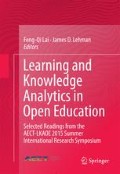Abstract
The purpose of this study was to explore the process and effectiveness of Open Educational Resources (OER)-based flipped classroom practice in an undergraduate course named “Internet and Distance Education.” The course was taught in Winter Semester, 2013 at the Zhejiang University, China to 15 undergraduate students majoring in education. The course was designed as a Web-based and blended course, which mainly included two parts. In the first 5 weeks of the course, students were invited to take a Coursera course named “Emerging Trends & Technologies in the Virtual K-12 Classroom.” In the last 6 weeks of the course, students were invited to learn Sakai-based course chapter contents and complete an OER-related assignment. Flipped classroom practices were utilized during the whole course. Data analysis found that participating students generally progressed through four stages in the OER-based flipped classroom: (1) being unfamiliar, (2) understanding, (3) adapting, and (4) becoming skilled. At the same time, students emotionally shifted from excitement and nervousness to relaxation, happiness, and confidence. Diary analysis and a general e-learner satisfaction survey found that students were generally satisfied with the OER-based flipped classroom practice. In their diaries, some students also put forward several suggestions for this form of instruction. Based on the findings, several suggestions to improve OER-based flipped classroom practices are offered.
Access this chapter
Tax calculation will be finalised at checkout
Purchases are for personal use only
References
Arbaugh, J. B. (2000). Virtual classroom characteristics and student satisfaction with internet-based MBA courses. Journal of Management Education, 24(1), 32–54.
Bangor, A., Kortum, P. T., & Miller, J. T. (2008). An empirical evaluation of the system usability scale. International Journal of Human-Computer Interaction, 24(6), 574–594.
Bonk, C. J., & Khoo, E. (2014). Adding some TEC-VARIETY: 100 + activities for motivating and retaining learners online. Bloomington, IN: Open World Books.
Breslow, L., Pritchard, D. E., DeBoer, J., Stump, G. S., Ho, A. D., & Seaton, D. T. (2013). Studying learning in the worldwide classroom: Research into edx’s first MOOC. Research & Practice in Assessment, 8, 13–25.
Brooke, J. (1996). SUS: A “quick and dirty” usability scale. In P. W. Jordan, B. Davies, R. S., Dean, D. L., & Ball, N. (2013). Flipping the classroom and instructional technology integration in a college-level information systems spreadsheet course. Educational Technology Research and Development, 61(4), 563–580. http://dx.doi.org/10.1007/s11423-013-9305-6.
DeBoer, J., Ho, A. D., Stump, G. S., & Breslow, L. (2014). Changing “course”: Reconceptualizing educational variables for Massive Open Online Courses. Educational Researcher, 43, 74–84.
Dillahunt, T., Wang, Z., & Teasley, S. D. (2014). Democratizing higher education: Exploring MOOC use among those who cannot afford a formal education. International Review of Research in Open and Distance Learning, 15(5), 177–196.
Kay, R. H., & Loverock, S. (2008). Assessing emotions related to learning new software: The computer emotion scale. Computers in Human Behavior, 24(4), 1605–1623.
Kong, S. C. (2014). Developing information literacy and critical thinking skills through domain knowledge learning in digital classrooms: An experience of practicing flipped classroom strategy. Computers & Education, 78, 160–173. doi:10.1016/j.compedu.2014.05.009.
Martin, F. G. (2012). Will massive open online courses change how we teach? Communications of the ACM, 55(8), 26–28. Retrieved November 14, 2014, from http://cacm.acm.org/magazines/2012/8/153817-will-massive-open-online-courses-change-how-we-teach/fulltext.
OECD. (2007). Giving knowledge for free. The emergence of open educational resources. Paris: OECD Publishing. Retrieved from http://www.oecd.org/edu/ceri/38654317.pdf.
Rizzardini, R. H., Gütl, C., Chang, V., & Morales, M. (2014). MOOC in Latin America: Implementation and lessons learned. In Uden, L., Tao, Y.-H., Tang, H.-C, & Ting, I.-H. (Eds.), Proceedings of the 2nd International Workshop on Learning Technology for Education in Cloud (pp. 147–158). Kaohsiung, Taiwan: Springer Netherlands.
Sandeen, C. (2013). Integrating MOOCS into traditional higher education: The emerging “MOOC 3.0” Era. Change: The Magazine of Higher Learning, 45(6), 34–39.
Tseng, S. C., & Tsai, C. C. (2010). Taiwan college students’ self-efficacy and motivation of learning in online peer assessment environments. The Internet and Higher Education, 13(3), 164–169.
Wikipedia (2014). Massive open online course. http://en.wikipedia.org/wiki/MOOCs.
Acknowledgments
This work was supported by grant from the National Social Science Foundation of China (13CGL113) and Instructional Reform funding from Department of Education of Zhejiang Province (kg2013020).
Author information
Authors and Affiliations
Corresponding author
Editor information
Editors and Affiliations
Rights and permissions
Copyright information
© 2017 Springer International Publishing Switzerland
About this chapter
Cite this chapter
Li, Y., Zhang, M., Bonk, C.J., Zhang, W., Guo, Y. (2017). Open Educational Resources (OER)-Based Flipped Classroom Practice in an Undergraduate Course. In: Lai, FQ., Lehman, J. (eds) Learning and Knowledge Analytics in Open Education. Springer, Cham. https://doi.org/10.1007/978-3-319-38956-1_9
Download citation
DOI: https://doi.org/10.1007/978-3-319-38956-1_9
Published:
Publisher Name: Springer, Cham
Print ISBN: 978-3-319-38955-4
Online ISBN: 978-3-319-38956-1
eBook Packages: EducationEducation (R0)

